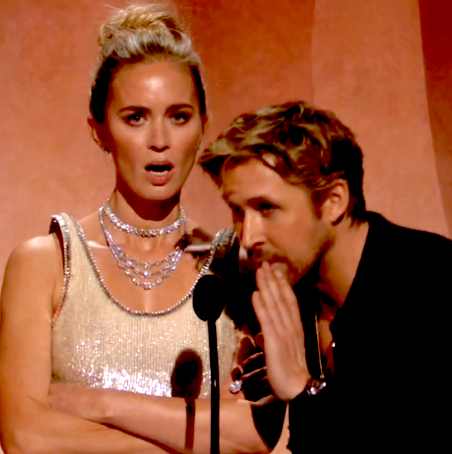Nathaniel in Venice: It's a brutal world but men sure make it worse!
 Thursday, September 9, 2021 at 12:00PM
Thursday, September 9, 2021 at 12:00PM Nathaniel reporting from Venice, final days...
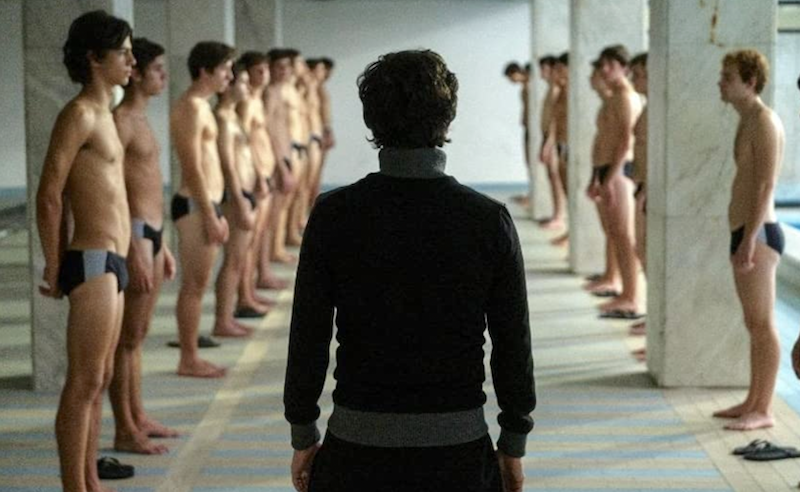
On day one Parallel Mothers set the theme that Venice would be about death. Not Death in Venice, mind you (different movie). And now the death of my Venice trip as I'll be flying across the Atlantic as you read this back to NYC. Power of the Dog (also on the first day of the fest) also revealed that you would not be able to escape films examining toxic masculinity. So here are three more doing the latter, one from Italy and two from Mexico.
The Catholic School (Stefano Mordini)
This mainstream Italian film which premiered out of competition belongs to the ever popular “true crime” genre. It seeks to analyze the environment that led to an infamous rape/murder committed by three upper class school boys in 1975 that set the Italian nation on edge...
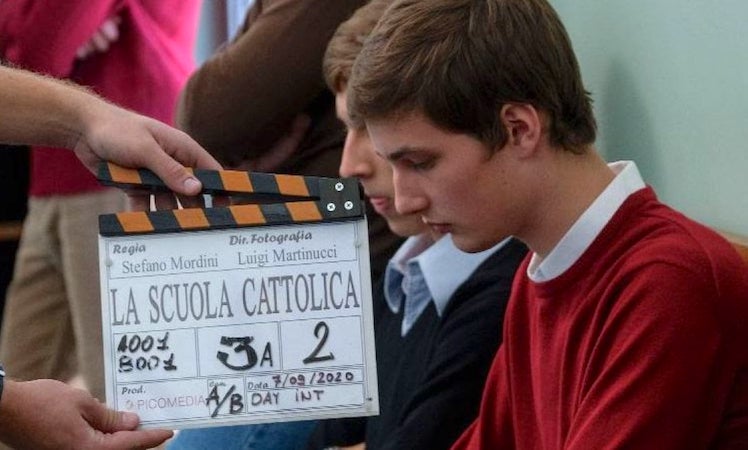
The film is interesting and ambitious but not always focused given how many things it's trying to juggle in its near constant voiceover: religion, parenting, masculinity, faith, character bios, peer pressure, sexuality, etcetera. It doesn't always follow up with the concepts it tosses out. Still, it’s very handsomely made and well-acted by a pleasingly enormous ensemble (we love an ensemble!) which is a mix of established older stars like Valeria Golino, Jasmine Trinca, and Riccardo Scamarcio as parents and a whole crop of young beautiful possible stars-to-be doing mostly fine work as the students.
Unfortunately it’s also questionable in its narrative progression and in its gaze. The use of title cards like “6 months earlier” and “one hour earlier” and “4 days earlier” made me crazy. For a few scenes I thought we were doing a nested film only going backwards in time, flashbacks within flashbacks within flashbacks. But nothing is “earlier” really as its (mostly) linear and the time designations are always about the crime and not about the scene we just finished watching. At least I think they are. It’s needlessly confusing when the story is already complex enough, requires loads of narration, and would work best as a story with true barreling linear momentum, heading inexorably towards a brutal known end. And about the crime itself… the movie has many thoughtful asides to what the boys are actually learning through their socialization, parents, and teachers, especially about the nature of “evil” as well as the process of “becoming a man”. But, for my taste, the film indulged grotesquely in the crime itself. Watching two naked girls be terrorized by sociopathic naked boys is deeply unpleasant especially when it feels like it takes up two thirds of the running time (it doesn’t but it felt that way). Yes, the atrocity and inhumanity is partially the point but the film will be deeply triggering to many in a way that it surely didn’t need to be to put the same points across. C/C-
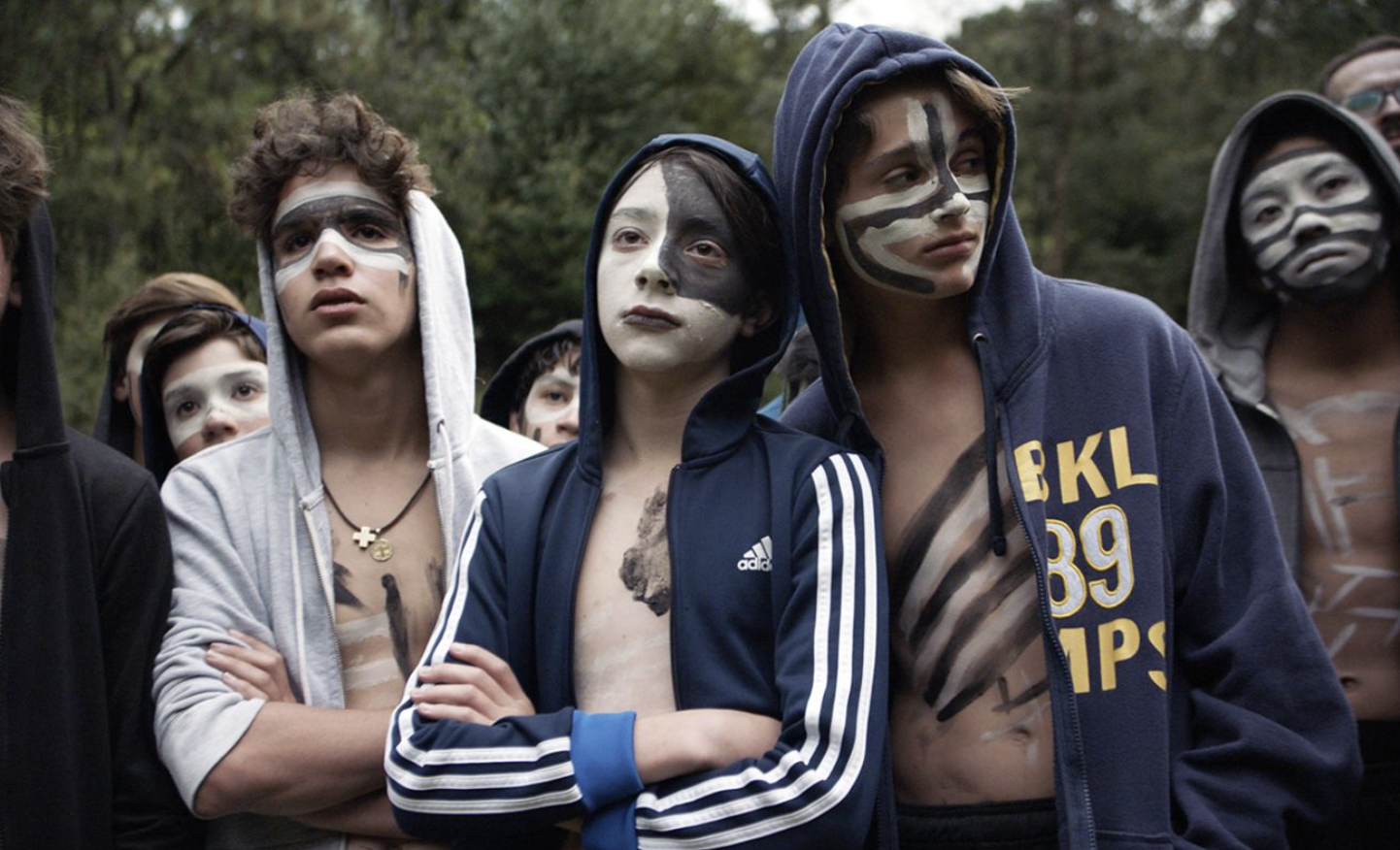
A Hole in the Fence (Joaquin Del Paso)
Like The Catholic School, this Mexican film is about upper class boys at a private instituation. The boys are much younger this time but it's the same basic idea; kids of the wealthy who will inherit the society. The film is looking at the subliminal -- hell sometimes right there on the surface, problematic things young boys or men are taught in the name of religion or in "becoming a man". Where The Catholic School comes from the true crime genre, and thus deploys realism and a yearning kind of psychological profiling, A Hole in the Fence is more fable-like and in a way much bleaker though its far easier to stomach since the camera keeps a distance from the most horrific stuff.
It starts with CGi birds flying over the Christian summer camp and it has the kind of shots and dialogue that indicate 'this is a metaphor!' straight away. Especially the titular object, a torn hole in the fence that surrounds the camp. The fence is meant to protect the boys from the horrors of the outside world which their leaders teach them to fear. In this case the outside world is the poor (and thus immoral) villagers. It doesn't take long to notice that what's inside the summer camp is much worse than anything that might be outside. The boys are bullies and the camp leaders encourage this since "strong" and "powerful" are what being a man is about. The teachers frequently lie to teach the students merciless lessons. You can see a lot of general things about A Hole in the Fence coming a mile away though not its particularly. It's impossible to miss very early on that we're headed toward Lord of the Flies style mayhem by the end of the picture. It's consistently involving, though, and like The Catholic School, picks the most sympathetic boys to focus on rather than wallowing in the growing pathologies of the others. But boy is it bleak and the last shot felt highly unneccessary, rubbing our noses in 'the evils that men do' rather than trusting that we've already heard the message. B-/C+
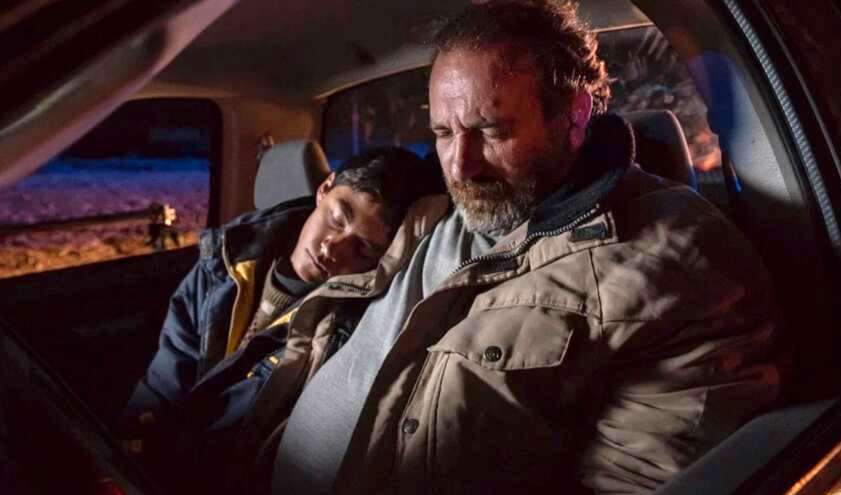
La Caja / The Box (Lorenzo Vigas)
I programmed this entirely due to the debut film from this Venezuelan auteur, From Afar, which was a tough sit but worth it and has lingered well in the memory. Given his award-winning debut one shouldn't expect something "light" here with his second narrative feature. Sure enough in the second scene we learn that The Box is heavy... figuratively if not literally. The titular object is a metal box filled with human remains (presumably ashes plus maybe a few bones given the size). Teenage Hatzin (Hatzin Navarrete) has been sent by his grandmother to fetch it, what's left of the father he barely remembers, from an exhumation site (unintentional callback to Parallel Mothers!) and is presented with a faded drivers license that was found with the body. Here comes the catch: Hours later he sees a man in the street that looks just like the license photo and he exits the bus and ditches his plan to return immediately to Mexico City. Is this his dead father, very much alive? That's the establishing scenario but whether or not the man is his father -- the film plays coy for a long while -- isn't as important as the fact that Hatzin absolutely believes that he is and he essentially becomes one taking the boy under his wing. Thus Hatzin wrestles (sometimes violently, the father figure is not a good man) with what it means to follow in someone's footsteps, be a part of someone but apart from them at the same time, and what our fathers teach us about how to move in the world. Those who've seen Vigas' debut know that he's quite skilled at examining enigmatic and complicated relationships between an older and a younger man (though in the first film it was sexual rather than paternal) and unflinching about the transactional nature of so many relationships and the darkness within men. B/B+
More Venice coverage
- Elisa's Diary #1 Parallel Mothers and Power of the Dog
- Elisa's Diary #2 The Card Counter, Hand of God, The Lost Daughter
- Elisa's Diary #3 Spencer, A Plein Temps, Il Buco
- Eiisa's Diary #4 Sundown, Official Competition, etc...
- Elisa Extra Dune - full review
- Elisa's Diary #5 L'Evenement, Lost Illusions, Mona Lisa...
- Elisa's Diary #6 Reflection, Captain Volkonoff Escaped, Old Henry, etc...
- Nathaniel in Venice #1 Parallel Mothers
- Nathaniel in Venice #2 Power of the Dog, Madeleine Collins
- Nathaniel in Venice #3 Atlantide, Les Promesses, The Lost Daughter
- Nathaniel in Venice #4 107 Mothers, Official Competition, Miracle, etc...
- Nathaniel in Venice #5 Last Night in Soho, Mona Lisa and the Blood Moon
- Nathaneil in Venice #6 Catholic School, A Hole in the Fence, La Caja


